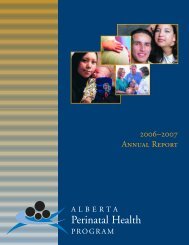Assistive Reproductive Technologies: A Literature Review and ...
Assistive Reproductive Technologies: A Literature Review and ...
Assistive Reproductive Technologies: A Literature Review and ...
You also want an ePaper? Increase the reach of your titles
YUMPU automatically turns print PDFs into web optimized ePapers that Google loves.
The costing was conducted from a hospital payer’s perspective expressed in 2002Canadian dollars. Physician fees <strong>and</strong> the cost of extra radiological investigationswere excluded from the study. Results indicate that the total hospital costs perpregnancy were $6750 for singletons, $39,430 for twins, $222,000 for triplets, <strong>and</strong>$278,400 for quadruplets. Higher costs associated with HOM pregnancies weredue to longer length of stay <strong>and</strong> greater frequency of cesarean delivery, pretermlabor, preeclampsia, <strong>and</strong> admissions to intensive care unit. Approximately 51% ofthe HOM pregnancies were a result of infertility treatment. The authors concludedthat maternal morbidity, perinatal morbidity, mortality, <strong>and</strong> associated hospitalcosts are associated with HOM pregnancies. Limitations of the study were that itdid not conduct a sensitivity analysis <strong>and</strong> it did not consider long term health <strong>and</strong>cost outcomes.Koivurova et al. 10 conducted a retrospective observational study comparing healthcare costs between IVF <strong>and</strong> naturally conceived infants in Finl<strong>and</strong>. Data onpregnancy, outpatient clinic visits, <strong>and</strong> hospital days were collected by a residentphysician from hospital records. Cost data were collected from the NationalResearch <strong>and</strong> Development Center for Welfare <strong>and</strong> Health <strong>and</strong> included costof infertility treatment, physician consultation, <strong>and</strong> hospital care. The IVF studypopulation consisted of 215 mothers (153 singletons <strong>and</strong> 62 twin pregnancies)<strong>and</strong> 255 infants (152 singletons <strong>and</strong> 103 twins). The non-IVF study populationconsisted of 662 mothers (580 singletons <strong>and</strong> 82 twin pregnancies) <strong>and</strong> 388infants (285 singletons <strong>and</strong> 103 twins). The costing was conducted from a payer’sperspective expressed in 2003 Euros. Results indicate that costs of an IVF singletoninfant were higher than naturally conceived singleton (€5778.1 vs. €4495.6) whilecosts were comparable between IVF <strong>and</strong> naturally conceived twins (€15,579.5 vs.€14,447). The authors concluded that costs associated with IVF singletons arehigher than naturally conceived singletons <strong>and</strong> multiple births increase health carecosts. The authors suggest that reducing multiple pregnancies is the most effectivemeans of reducing health care costs resulting from IVF. Limitations of the studywere that it did not consider long term health <strong>and</strong> cost outcomes.Lukassen et al. 11 conducted a retrospective observational study comparing healthcare costs between singleton <strong>and</strong> twin pregnancies after receiving IVF. Costs werecompared from pregnancy until 6 weeks post delivery. Data was collected from theIVF population at the University Medical Center. The study population consistedof all couples with a live-born singleton or at least one live born twin after IVFtreatment between 1995 <strong>and</strong> 2001. From this population, 172 most recent twinpregnancies <strong>and</strong> 168 singleton pregnancies with similar dates of embryo transferswere selected for the analysis. Costs include antenatal care, delivery, <strong>and</strong> maternal<strong>and</strong> neonatal admission days. Data on antenatal care, mode of delivery, daysof maternal hospital admission, <strong>and</strong> days of neonatal hospital admission wasobtained through mail out questionnaires. Unit costs were obtained from theDutch National Health Tariffs Authority <strong>and</strong> were expressed in 2003 Euros. Thecosting was conducted from a payer’s perspective. Results indicate that total costswere €10,920 higher per twin pregnancy than per singleton pregnancy (€25496 <strong>Assistive</strong> <strong>Reproductive</strong> <strong>Technologies</strong>:a <strong>Literature</strong> <strong>Review</strong> <strong>and</strong> Database Analysis
















